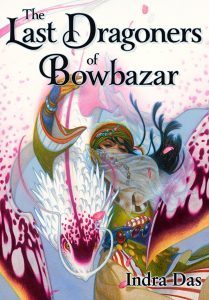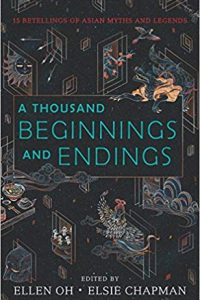Gary K. Wolfe Reviews The Last Dragoners of Bowbazar by Indra Das
 The Last Dragoners of Bowbazar, Indra Das (Subterranean 978-1-64524-087-7, $40.00, 120pp, hc) June 2023. Cover by Tran Nguyen.
The Last Dragoners of Bowbazar, Indra Das (Subterranean 978-1-64524-087-7, $40.00, 120pp, hc) June 2023. Cover by Tran Nguyen.
Indra Das’s The Last Dragoners of Bowbazar is a gorgeously written novella which is part coming-of-age tale, part love letter to fantasy, part family mystery, and part elegantly understated fable of identity. Set in the Bowbazar neighborhood of Calcutta in the 1990s (which presumably accounts for the anglicized colonial spelling), its narrator Ru physically resembles his Indian schoolmates, ‘‘but it didn’t count,’’ since he has no idea of his own ethnicity. ‘‘I didn’t know whether we were Hindu or Muslim or Christian or God only knows. I didn’t know whether we were Bengali or Anglo-Indian or Marwari.’’ His name doesn’t help much; Ru is short for Reuel George (which we will come to suspect is a tribute to Tolkien, after we learn of his father’s passion for fantasy fiction), and Ru’s own parents evade his questions by vaguely claiming the family is descended from nomads.
Despite the reluctance of Ru’s parents to share information about his heritage, various clues have appeared since his earliest childhood, though Ru is uncertain how reliable these memories are, since ‘‘forgetting and remembering was a cycle I have relived many times.’’ As a small child, his grandmother shows him a pod which she says is a dragon in its pupal stage, and later buries a strange shimmering egg in the garden. His father rather unhelpfully tells him the surname George is a reference to St. George, the dragon slayer. Most tellingly, the family garage contains a number of aquaria which contain sleek black drakes, or immature dragons, and Ru’s extended family runs a secretive Dragoner’s Club, where supposedly dragon meat is served.
Things begin to change for Ru on his 13th birthday, when he befriends Alice, the daughter of the owners of a Chinese restaurant downstairs from Ru’s home. They grow into close friends, sharing their interest in The Lord of the Rings and gaming, as well as the usual frustrations of teens dealing with families. Meanwhile, Ru’s father, having spent years working on a fantasy novel that sounds a lot like Anne McCaffrey, lets his old American friend Sam publish it in the US, where it fails utterly. (The pseudonym that the father uses, Elric Ray Kroeber, is a pretty direct tribute to three of his favorite fantasy writers.) At his 18th birthday, after seeing the first Lord of the Rings movie with Alice, Ru decides to show her some of the secret rooms of his family’s house, bringing them yet closer. But Das refrains from conventional Western romance clichés; both Alice’s and Ru’s gender and sexual identities remain a bit fluid, and along the way (thanks to that talkative grandmother) Ru learns that his grandfather began life as a woman, à la Woolf’s Orlando. The second half of the story, as both the mysteries and Ru and Alice’s relationship move toward some sort of resolution, takes on an almost ruminative tone, a reflection on both memory and magic that implies a much larger, more fantastical tale, but one that never loses its grounding in character. It’s also a fine example of what novellas do best: invoking the magic, but keeping a clear focus on the story while leaving a fair amount of the detail up to us.
Gary K. Wolfe is Emeritus Professor of Humanities at Roosevelt University and a reviewer for Locus magazine since 1991. His reviews have been collected in Soundings (BSFA Award 2006; Hugo nominee), Bearings (Hugo nominee 2011), and Sightings (2011), and his Evaporating Genres: Essays on Fantastic Literature (Wesleyan) received the Locus Award in 2012. Earlier books include The Known and the Unknown: The Iconography of Science Fiction (Eaton Award, 1981), Harlan Ellison: The Edge of Forever (with Ellen Weil, 2002), and David Lindsay (1982). For the Library of America, he edited American Science Fiction: Nine Classic Novels of the 1950s in 2012, with a similar set for the 1960s forthcoming. He has received the Pilgrim Award from the Science Fiction Research Association, the Distinguished Scholarship Award from the International Association for the Fantastic in the Arts, and a Special World Fantasy Award for criticism. His 24-lecture series How Great Science Fiction Works appeared from The Great Courses in 2016. He has received six Hugo nominations, two for his reviews collections and four for The Coode Street Podcast, which he has co-hosted with Jonathan Strahan for more than 300 episodes. He lives in Chicago.
This review and more like it in the July 2023 issue of Locus.
 While you are here, please take a moment to support Locus with a one-time or recurring donation. We rely on reader donations to keep the magazine and site going, and would like to keep the site paywall free, but WE NEED YOUR FINANCIAL SUPPORT to continue quality coverage of the science fiction and fantasy field.
While you are here, please take a moment to support Locus with a one-time or recurring donation. We rely on reader donations to keep the magazine and site going, and would like to keep the site paywall free, but WE NEED YOUR FINANCIAL SUPPORT to continue quality coverage of the science fiction and fantasy field.
©Locus Magazine. Copyrighted material may not be republished without permission of LSFF.






